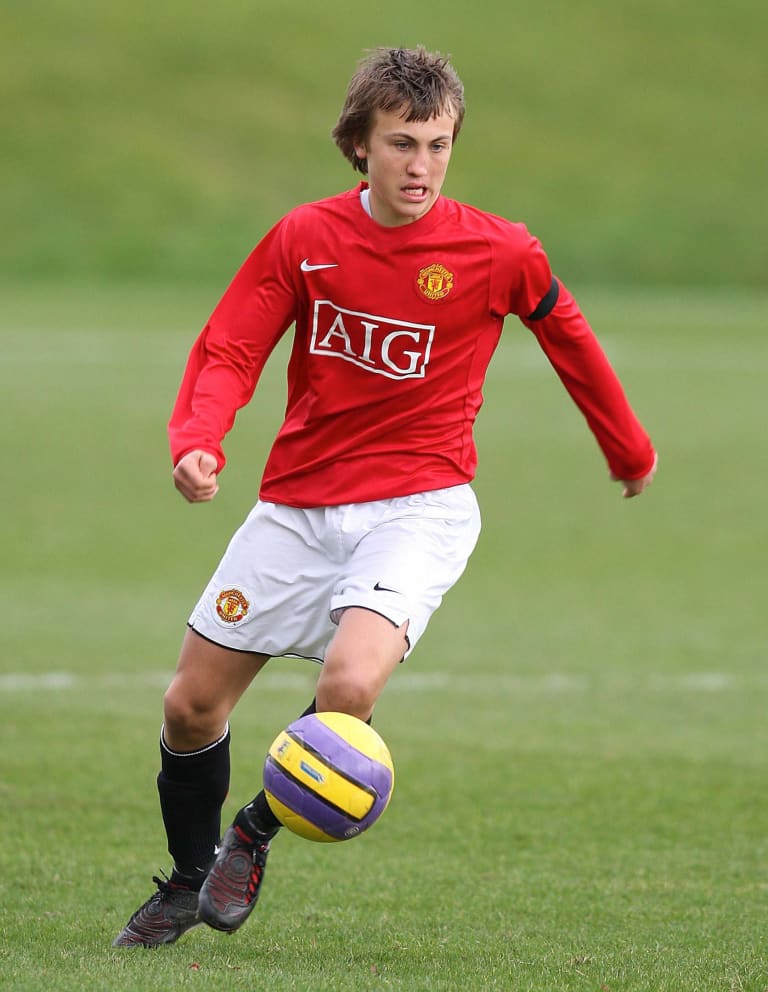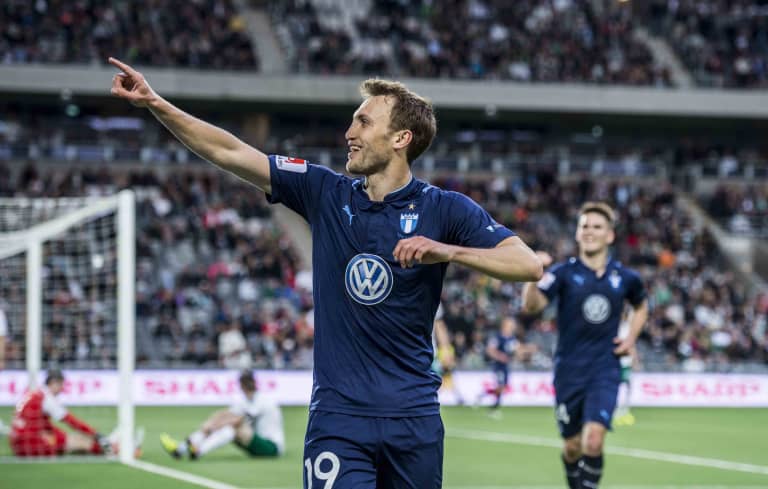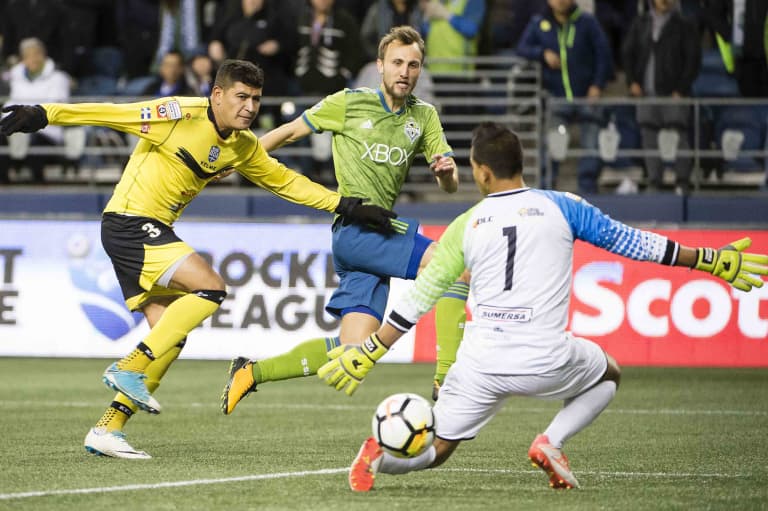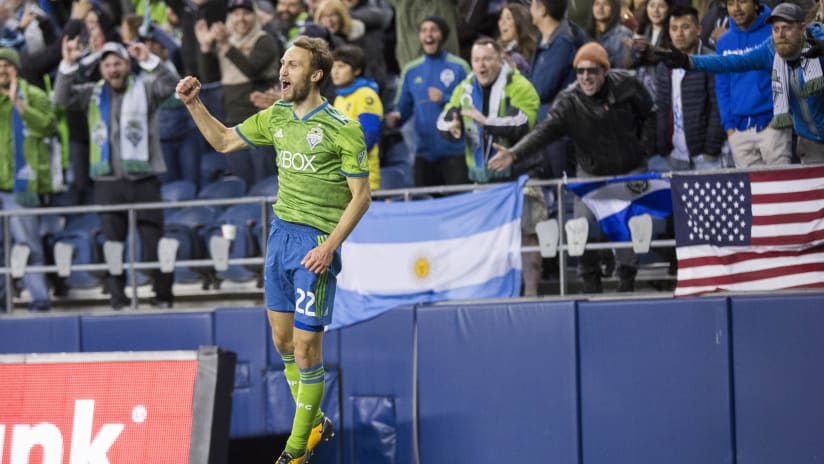This is the lead feature in Issue 12 of Sounders Monthly. Copies are available for free at The NINETY, GuestLink Services locations, Soccer Celebration and Membership Central. You can also access it on the Sounders Mobile App.
As Paul McGuinness stepped into a gym in Manchester, England, he was struck by what he saw. There in front of him stood a small, skinny teenager, a mop of unkempt brown hair resting on his head and an accent that most certainly wasn’t local to the area.
“When he came to us on trial he was very small, but he ran rings around everybody,” McGuniness, a former youth coach at Manchester United, said of Magnus Wolff Eikrem. “He was so clever and ahead of the game, and good technically, that even though a lot of them were bigger and stronger, he looked like a kid who could really do something. I remember one session, it was maybe only three or four aside, but he had all the answers.
“He had the sort of technique of someone like say, David Beckham. He was small when he first came to the club at 14 or 15, and Magnus was reminding me of him in his technical work and his love for the game.”
Eikrem, who signed with the Seattle Sounders this past offseason, was a long way from his home in Molde, a small town on the western coast of Norway. Molde was where he had grown up and first been spotted by scouts attending a soccer school organized by his hero, and Manchester United legend, Ole Gunnar Solskjær.
The emotions bubbling inside of him would be a lot for an adult to process, let alone a boy who had grown up idolizing everything by which he was now surrounded.

“I was quite young, and being in the same place as all these world-class players, it was quite a shock,” Eikrem said of his early days at Old Trafford. “Ryan Giggs, Paul Scholes, everyone. Seeing them and being around them was really good. At first, I went on my own, then my mother came to live with me after a year and stayed for six months. Then Joshua King came over with his family so I just stayed with them.”
Stationed at the club’s Trafford Training Centre, near the village of Carrington, Greater Manchester, Eikrem was challenged physically, mentally and technically on a daily basis.
The hallways of the academy building are adorned with murals of past graduates such as Giggs, Scholes and Beckham. Talk of their achievements still echoes. The academy’s fingerprints are not only found on those who graduate to the status of First Team regular at Old Trafford, like Paul Pogba and Jesse Lingard, but also those who leave for other clubs, such as Chelsea’s Danny Drinkwater or Arsenal’s Danny Welbeck.
Trying to distill such a comprehensive education in a compendious way is impossible, but when pressed, one thing did stand out to Eikrem.
“Being around all these big players and seeing how humble they were, [I was] just trying to work as hard as they did,” he said. “They were earning so much money and winning trophies every year, but every day in training they were on it. That’s what stuck with me.”
McGuinness would often find Eikrem still out on the pitch after training, a bag of balls beside him, practicing his free kicks and refining his already impressive technical skills.
Eventually, however, the necessity of in-game experience supplanted anything that could be taken from just training alone.
As a youngster at Manchester United, Eikrem could have fielded offers from across Europe, but in soccer, timing is often everything, and Eikrem’s decision to move on in January 2011 came just months after his mentor in the reserves, Solskjær, had chosen to do the same, swapping a coaching role with Man United for a senior position at Molde FK.
“Leaving Manchester United is always difficult, but I had to play,” Eikrem said. “I was getting [to be] like 20, 21, so I wasn’t that young anymore, and it was my hometown club. I knew Ole was going to go back home and I knew he was going to win things at Molde. He’s been a big part of my career, and when he took over the reserves I started playing.
He had the sort of technique of someone like say, David Beckham. — Paul McGuinness, former Manchester United youth coach
“He’s been through so much and so I was learning from the best, and along with Warren Joyce, they were a great pair,” Eikrem continued. “I loved Ole’s training sessions, and how he spoke to me. I remember once I was injured and he just told me, ‘I don’t care if there’s something wrong, you have to just stay on the pitch…’ That gave me great confidence.”
There was a blend of nervousness and pressure attached to joining Molde ahead of what would be their centenary. Not only had Eikrem grown up supporting the club, but the team was attempting to usurp a dominant Rosenborg side that had won all but three of the previous 15 Norwegian league titles.
Solskjær was ambitious, though, and his plan was to build a young and vibrant roster with Eikrem at the heart of things. During the offseason, the club also signed American Joshua Gatt and Eikrem’s good friend Jo Inge Berget, who also made the move to MLS before the 2018 season when he signed with New York City FC.
The team won back-to-back league titles in 2011 and ‘12 — the first in the club’s history — and the Norwegian Cup in ‘13. As well as club success, Eikrem also achieved his other goal of senior national team recognition when he made his debut for Norway in 2012.

Wolff EIkrem celebrates a goal with Sweden’s Malmö
|
Getty Images
“For the years he was in Norway, he was the best player in the league,” Berget said. “He’s a smart guy, he reads the play very well and his right foot is pure class. He’s one of the best I’ve played with as a playmaker. He always knows when to pick a pass and how to pass. He likes to dictate the play verbally, with the ball, controlling the tempo.”
Fueled by momentum and the success of two league titles, Eikrem’s potential was fast being realized. That caught the attention of clubs abroad, notably Dutch side Heerenveen, who signed him in June 2013.
Things started well. He scored his first goal for the club against Dutch giants Ajax, but by the start of 2014, he was on the move once again, joining Solskjær for a third stint. This time his mentor had chosen to return to English football and left Molde to take the reins at Cardiff City in the Premier League.
“It was a no-brainer,” Eikrem said of his decision to join Cardiff. “I saw the guys like Danny Drinkwater, Craig Cathcart and James Chester all playing in the Premier League or the Championship, and so I wanted to go back. Maybe it was too early for me to join them, but at the time it was a no-brainer.”
Eikrem was one of three Norwegians to join Cardiff that month, along with Berget and Mats Møller Dæhli. Unfortunately, the Welsh capital would not be a happy home for them.
He’s one of the best I’ve played with as a playmaker. — Jo Inge Berget, former teammate and current NYCFC forward
“It didn’t go as any of us had planned,” Berget said. “Solskjær knew what we were capable of when he brought us in, but the club got in a bad situation where they were bottom of the table and struggling each game. It was hard to bring in new players who’ve never played in the Premier League before and for them to save the team from going down.”
Eikrem struggled to find his rhythm amid the chaos. Cardiff was relegated at the end of the season, and Solskjær was sacked not long after. The pair struggled to earn the trust of his replacement, Russell Slade, and by December 2014 Eikrem had asked the club to release him from his contract.
“Some players can just sit back and relax on a good salary, but he wanted to play and get even better and that says a lot about who he is,” Berget said.
For the first time in his career, Eikrem was unemployed. The plight of trying to find work paled in significance to the greatest struggle of his career, though, when he was diagnosed with Type 1 diabetes at age 16.
“The world just suddenly changes,” he said. “I had to be more careful. It took quite a bit of time to get over it and get used to it and play soccer again. I think I was out for maybe three or four months. I was training a little bit, but it was really hard to get used to.”
In the midst of such a situation, it can be difficult to believe that normality will ever return. Eikrem could have been forgiven for drowning in self-pity, but just as his future in the game seemed uncertain, he received a special visitor at his bedside.
“It was maybe the second or third day there in the hospital when [legendary former Manchester United manager] Sir Alex Ferguson came to visit me,” Eikrem said. “He told me about the other players who had diabetes, and that it wasn’t going to be a problem, take your time, and then he looked at my mum and said, ‘He’s going to be tall enough, so don’t worry.’ That was a massive boost for a 16-year-old, the manager of the biggest club in the world telling you that, but that just goes to show how the place was.”

Wolff Eikrem scores his first Sounders goal against Santa Tecla in CCL
|
USA Today Sports
Thankfully for Eikrem, there was one other player who had left Cardiff in almost identical circumstances a little over a month after him: Berget. When his good friend landed in Sweden with Malmö in mid-January 2015, it seemed only right that a reunion with Eikrem would follow seven days later.
“I’ve played with Jo Inge on the youth national teams, at Molde, at Cardiff, at Malmö, I shared a room with him at Malmö. I’ve probably spent more time with Jo Inge than I have my girlfriend at some points,” Eikrem said laughing.
In Sweden, the pair enjoyed times more reminiscent of Molde. They won two Allsvenskan league titles in 2016 and ‘17 and tasted Champions League football. There was also individual success for Eikrem along the way, who was named the 2016 Swedish league midfielder of the year.
“He made a league record of assists in Malmö with his corners and free kicks in 2016,” Berget explained. “He had a lot of great moments at the club, but setting the record of assists is pretty standout.”
It’s certainly a period the 27-year-old reflects on positively, even if he caveats talk of his success with the frustration that they did not win the 2016 Svenska Cupen final. He still bears a fiercely competitive side instilled in him by Manchester United.
Sweden was also where Eikrem showed his versatility, playing not only centrally but also out wide. Reminiscent of a chess player in his ability to control and dictate the game from anywhere on the field, it is that blend of technique and intelligence that first drew Seattle’s interest.
“He’s technically clean, a good passer, has good vision and is a goal-dangerous type of player that likes to combine with others,” said Sounders Head Coach Brian Schmetzer. “He’s got a good pedigree and he finds ways to be effective in the attacking part of the field. I think he plays well with Nico [Lodeiro] and I think he fits also with Clint [Dempsey]. I know Clint enjoys playing with him.
“You know the experienced guys on our squad, they measure a new guy up,” Schmetzer continued. “They won’t tell me, but I can see it in their body language a little bit, if they’re happy or frustrated. The new guy that comes in they give him the up and down, and Magnus has passed their test so far.”
Eikrem is looking to bring us unique and incisive skill set to Seattle, along with a winner’s mentality fortified all throughout Europe.
The Norwegian says he can feel that same character in the Sounders’ locker room, where winning is not a hope but an expectation. And although Eikrem is only a few steps into his career at CenturyLink Field, history suggests that wherever he goes, success often tends to follow.





